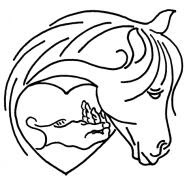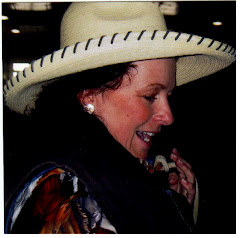
Question: This year is an especially long and cold winter with very poor riding conditions. Because I do not have an indoor facility I have spent very little time with my horse. I am longing for warmer weather to be able to ride and play with my horse. What can I do in the mean time to better my riding skills?
Answer: Winter may severely challenge your horse riding routine. So we may have to alter a few things. I like what Theodor Roosevelt said, "Do what you can, with what you have, with where you are."
This winter most of us have been snowed in with 4-8 foot high snow drifts wondering if we will ever see spring. Unless we have an indoor riding arena we aren’t doing much riding right now, so we will have to do what we can with what we have. We could perhaps haul to an indoor arena to ride, but most of us can’t even get to our trailers right now, not to mention the thought of hauling my horses on slick roads is not to appealing. So in order to counter-act the gloominess and stress of the weather we can focus on some other areas that can help improve our riding. Aside from watching training DVD's and reading good horse books and magazines there are some things we can do to improve our riding right now.
Balance is one of the biggest keys to riding. Our horse's feel every move we make when we are astride, and react to every unbalanced move however subtle. So anything we can do to recognize the unbalanced errors we have in our own bodies and correct them before we get on the horse will help improve our riding.
To find our balance we need body awareness especially of our core. With body awareness and balance we can clearly see where our weight is shifting and understand what our horse is feeling. These subtleties can affect our horse's confidence and behavior. How can we expect our horse to trust a person to guide him if the rider can't even manage his own weight? A balanced confident rider creates a balanced confident horse.
There is an old cavalry saying, “it’s never the horse, always the rider”. So if we can do something this winter to improve our balance, flexibility, breathing, core strength, focus, and overall awareness of our bodies it will make our “fair weather” riding more productive. We will be ready for spring and competition or pleasure riding whichever you choose if we start doing something right now. Plus some good exercise is proven to relieve stress and uplift your spirit.
To become a better rider one has to become a conscious rider, which is to realize that sensitivity and understanding of your body-mind connection are essential to riding. It is important for us to understand that using your body to communicate with the horse is the essence of riding and your most challenging task. As you gain valuable insights and techniques for effectively using your own body your horse will thank you by reflecting your positive changes and become more willing, balanced and pleasurable to ride.
It is a known fact that horses communicate through a physical language that includes postures, expressions, and movements. To be successful at riding, we need to speak in a similar non-verbal manner with the horse. For most people, body language is not employed as a conscious method of communicating. So it is our job to acquire the skills that enable us to speak with the horse physically, which includes self-control of body and mind with powerful focus. For safety and efficiency we need to learn a balanced position in the saddle, as well as the ability to focus and relax on demand. Refining the awareness of our own body and coordination is needed to clearly communicate to the horse without disturbing him.
Creating harmony on the back of a large, unpredictable flight animal is a complex learned activity for horses and humans. Most every rider seeks to establish union with the horse—it is a universal goal despite the various reasons we ride. And while riding is not a "natural" act, it can become a "harmonious" one when we cultivate the appropriate level of self-discipline to safely enjoy our chosen mounted activities. Whether we are content with casual riding, or wish to pursue a higher degree of sophisticated control, riders today must take responsibility for our equestrian education. This starts with an exploration of the many learning opportunities available.
People who come to me for lessons often face "obstacles" that block their efforts to harmoniously connect with the horse's movement. Traits such as: insufficient awareness of their own body, lack of core strength, chronic tension, poor posture, one-sidedness, impatience, anxiety, fear, and excessive grip with arms and legs are some of the common hurdles riders need to overcome. Sadly, it is our equine partner who suffers most when "horse control" is prematurely attempted before our own obstacles have been identified, addressed, and eliminated. This approach is the absolute longest road toward harmony, and can create even more riding obstacles, such as: confusion, frustration, struggle, and forceful manipulation—all of which negatively impact the safety and well-being of rider and horse, and increase the risks already inherent in riding.
In my opinion one of the best ways to become more aware of your body, strengthen your core, improve your breathing, flexibility, focus and ability to relax is through yoga. Yoga is the oldest self-improvement practice in the world. Yoga has survived because it works. I have been doing yoga this winter plus other exercises for general overall tone to keep my body in shape for spring riding.
Here are some benefits of Yoga that I know will help improve your riding.
Benefits: Posture
With increased flexibility and strength comes better posture. Most standing and sitting poses develop core strength. That's because you're counting on your deep abdominals to support and maintain each pose. With a stronger core, you're more likely to sit and stand "tall." Another benefit of yoga is the increased body awareness. This heightened awareness tells you more quickly when you're slouching or slumping so you can adjust your posture. (All very important to a good independent seat when riding.)
Benefits: Breathing
Yoga provides time-tested practices for improving your breathing. I believe breathing skills are essential for equestrians to move in rhythmic harmony with the horse. And they are definitely needed to keep us calm and relaxed in a stressful situation with a horse. Because of the deep, mindful breathing that yoga involves, lung capacity often improves. This in turn can improve sports performance and endurance. Most forms of yoga emphasize deepening and lengthening your breath. This stimulates the relaxation response -- the opposite of the fight-or-flight adrenaline boost of the stress response. Again we need to relax in order to ride well.
Benefits: Less stress, more calm
Even beginners tend to feel less stressed and more relaxed after their first class. Some yoga styles use specific meditation techniques to quiet the constant "mind chatter" that often underlies stress. Other yoga styles depend on deep breathing techniques to focus your mind on the breath. When this happens, your mind becomes calm. Again it is important to stay calm with horses in many situations.
Benefits: Concentration and mood
Harder to pin down and research scientifically, concentration and the ability to focus mentally are common benefits you'll hear yoga students talk about. The same is true with mood. Nearly every yoga student will tell you they feel happier and more contented after class. Recently, researchers have begun exploring the effects of yoga on depression, a benefit that may result from yoga's boosting oxygen levels to the brain. Again focus and concentration makes for a much better rider.
You might want to try yoga for stress management and relaxation from the challenges we have faced this winter. It will also benefit your physical body for better riding this spring. Look around for classes in your area to see what's offered. You can also learn yoga from books and videos. I personally tune in to Veria TV on Dish every morning at 9:00 and follow the program. If you don’t want to do Yoga at least try to implement some type of exercise program inside these cold winter days and you will reap the rewards this spring. Come spring your horse will be happy you improved your body tone, posture, strength, breathing, and ability to stay calm.
For more information on exercise and simulations classes to develop better feel and riding ability check out Sherry's new website at www.heartinyourhand.com and sign up for one of our summer horsemanship camps or clinics.
Happy Trails,
Sherry Jarvis
Author of "Win Your Horse's Heart" (And Be a Better Horseman













No comments:
Post a Comment